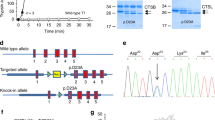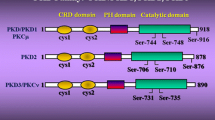Abstract
Trypsin activity is properly suppressed in the pancreatic acinar cells under normal conditions. A small amount of trypsinogen is converted to active trypsin and inactivated by pancreatic secretory trypsin inhibitor (PSTI), thereby preventing damage to pancreatic acinar cells as a first line of defense. However, if trypsin activation (due to excessive stimulation of pancreatic acinar cells) exceeds the capacity of PSTI, a subsequent cascade of events leads to the activation of various proteases that damage cells. This can be interpreted as the main causative event of pancreatitis onset. Trypsin produced in and secreted from the pancreatic acinar cells activates protease activated receptor-2 (PAR-2), which is present at high densities on the luminal surfaces of pancreatic acinar cells and duct cells. Results of PAR-2 activation are the production of cytokines and the regulation of exocrine function via a negative feedback loop. Thus, the actions of trypsin, trypsin inhibitor (PSTI), and trypsin receptor (PAR-2) in the pancreas are strongly interconnected.
Similar content being viewed by others
References
DC Whitcomb MC Gorry RA Preston W Furey MJ Sossenheimer CD Ulrich et al. (1996) ArticleTitleHereditary pancreatitis is caused by a mutation in the cationic trypsinogen gene Nat Genet 14 141–5 Occurrence Handle8841182 Occurrence Handle1:CAS:528:DyaK28XmtVKnt7g%3D Occurrence Handle10.1038/ng1096-141
H Witt W Luck HC Hennies M Classen A Kage U Lass et al. (2000) ArticleTitleMutations in the gene encoding the serine protease inhibitor, Kazal type 1 are associated with chronic pancreatitis Nat Genet 25 213–6 Occurrence Handle10835640 Occurrence Handle1:CAS:528:DC%2BD3cXjvFOgtLk%3D Occurrence Handle10.1038/76088
M Hirota K Kuwata M Ohmuraya M Ogawa (2003) ArticleTitleFrom acute to chronic pancreatitis: the role of the mutations in the pancreatic secretory trypsin inhibitor gene JOP 4 83–8 Occurrence Handle12629264
M Ohmuraya M Hirota M Araki N Mizushima M Matsui T Mizumoto et al. (2005) ArticleTitleAutophagic cell death of pancreatic acinar cells in serine protease inhibitor Kazal type 3-deficient mice Gastroenterology 129 696–705 Occurrence Handle16083722 Occurrence Handle1:CAS:528:DC%2BD2MXpvVWmtrY%3D Occurrence Handle10.1016/j.gastro.2005.05.057
M Varallyay L Graf M Toth (1998) ArticleTitleTwo mutations in the rat trypsin confer resistance against autolysis Biochem Biophys Res Commun 243 56–60 Occurrence Handle9473479 Occurrence Handle1:CAS:528:DyaK1cXpsVWktQ%3D%3D Occurrence Handle10.1006/bbrc.1997.8058
MC Gorry D Gabbaizedeh W Furey LK Gates SuffixJr RA Preston CE Aston et al. (1997) ArticleTitleMutations in the cationic trypsinogen gene are associated with recurrent acute and chronic pancreatitis Gastroenterology 113 1063–8 Occurrence Handle9322498 Occurrence Handle1:CAS:528:DyaK2sXmslOls7Y%3D Occurrence Handle10.1053/gast.1997.v113.pm9322498
N Teich J Mossner V Keim (1998) ArticleTitleMutations of the cationic trypsinogen gene in hereditary pancreatitis Hum Mutat 12 39–43 Occurrence Handle9633818 Occurrence Handle1:CAS:528:DyaK1cXjvValsr4%3D Occurrence Handle10.1002/(SICI)1098-1004(1998)12:1<39::AID-HUMU6>3.0.CO;2-P
I Nishimori M Kamakura K Fujiwara-Adachi M Morita S Onishi K Yokoyama et al. (1999) ArticleTitleMutation in exons2 and 3 of the cationic trypsinogen gene in Japanese families with hereditary pancreatitis Gut 44 259–63 Occurrence Handle9895387 Occurrence Handle1:CAS:528:DyaK1MXhtl2gsb4%3D Occurrence Handle10.1136/gut.44.2.259
MM Lerch E Albrecht M Ruthenberger J Mayerle W Halangk B Kruger (2003) ArticleTitlePathophysiology of alcohol-induced pancreatitis Pancreas 27 291–6 Occurrence Handle14576489 Occurrence Handle10.1097/00006676-200311000-00003
LM Chen MP Audrezet B Mercier I Quere C Ferec (1999) ArticleTitleExclusion of anionic trypsinogen and mesotrypsinogen involvement in hereditary pancreatitis without cationic trypsinogen gene mutations Scand J Gastroenterol 34 831–2 Occurrence Handle10499487 Occurrence Handle1:CAS:528:DyaK1MXmtlGgsbs%3D Occurrence Handle10.1080/003655299750025796
M Sahin-Toth L Graf M Toth (1999) ArticleTitleTrypsinogen stabilization by mutation Arg117-to-His: a unifying pathomechanism for hereditary pancreatitis? Biochem Biophys Res Commun 264 505–8 Occurrence Handle10529393 Occurrence Handle1:CAS:528:DyaK1MXms12qtrw%3D Occurrence Handle10.1006/bbrc.1999.1565
M Sahin-Toth M Toth (2000) ArticleTitleGain-of-function mutations associated with hereditary pancreatitis enhance autoactivation of human cationic trypsinogen Biochem Biophys Res Commun 278 286–9 Occurrence Handle11097832 Occurrence Handle1:CAS:528:DC%2BD3cXotlKks7Y%3D Occurrence Handle10.1006/bbrc.2000.3797
K Kuwata M Hirota H Sugita M Kai N Hayashi M Nakamura et al. (2001) ArticleTitleGenetic mutations in exon 3 and 4 of pancreatic secretory trypsin inhibitor in patients with pancreatitis J Gastroenterol 36 612–8 Occurrence Handle11578065 Occurrence Handle1:CAS:528:DC%2BD3MXntlaksL4%3D Occurrence Handle10.1007/s005350170045
RH Pfutzer MM Barmada APJ Brunskill R Finch PS Hart J Neoptolemos et al. (2000) ArticleTitleSPINK1/PSTI polymorphisms act as disease modifiers in familial and idiopathic chronic pancreatitis Gastroenterology 119 615–23 Occurrence Handle10982753 Occurrence Handle1:CAS:528:DC%2BD3cXmslSku7g%3D Occurrence Handle10.1053/gast.2000.18017
JM Chen B Mercier M Audrenet O Raguenes I Quere C Ferec (2000) ArticleTitleMutations of the pancreatic secretory trypsin inhibitor (PSTI) gene in idiopathic chronic pancreatitis Gastroenterology 120 1061–4
K Kaneko Y Nagasaki T Furukawa H Mizutamari A Masamune T Shimosegawa et al. (2001) ArticleTitleAnalysis of the human pancreatic secretory trypsin inhibitor (PSTI) gene mutations in Japanese patients with chronic pancreatitis J Hum Genet 46 193–7 Occurrence Handle10.1007/s100380170082
K Kuwata M Hirota I Nishimori M Otsuki M Ogawa (2003) ArticleTitleMutational analysis of the pancreatic secretory trypsin inhibitor (PSTI) gene in familial and juvenile pancreatitis in Japan J Gastroenterol 38 365–70 Occurrence Handle12743777 Occurrence Handle1:CAS:528:DC%2BD3sXjslWhtrw%3D Occurrence Handle10.1007/s005350300065
K Kuwata M Hirota H Shimizu M Nakae S Nishihara A Takimoto et al. (2002) ArticleTitleFunctional analysis of recombinant pancreatic secretory trypsin inhibitor protein with amino-acid substitution J Gastroenterol 37 928–34 Occurrence Handle12483248 Occurrence Handle1:CAS:528:DC%2BD38XptFGisLo%3D Occurrence Handle10.1007/s005350200156
ML Steer J Meldolesi (1987) ArticleTitleThe cell biology of experimental pancreatitis N Engl J Med 316 144–50 Occurrence Handle3540666 Occurrence Handle1:CAS:528:DyaL2sXhtFOhtbY%3D Occurrence Handle10.1056/NEJM198701153160306
FS Gorelick IM Modlin SD Leach (1992) ArticleTitleIntracellular proteolysis of pancreatic zymogens Yale J Biol Med 65 407–20 Occurrence Handle1340058 Occurrence Handle1:CAS:528:DyaK2cXitFegtLs%3D
N Mizushima Y Ohsumi T Yoshimori (2002) ArticleTitleAutophagosome formation in mammalian cells Cell Struct Funct 27 421–9 Occurrence Handle12576635 Occurrence Handle10.1247/csf.27.421
M Ohmuraya M Hirota K Araki H Baba K Yamamura (2006) ArticleTitleEnhanced trypsin activity in pancreatic acinar cells deficient for serine protease inhibitor Kazal type 3 Pancreas 33 104–6 Occurrence Handle16804421 Occurrence Handle10.1097/01.mpa.0000226889.86322.9b
H Helin M Mero H Markkula M Helin (1980) ArticleTitlePancreatic acinar ultrastructure in human acute pancreatitis Virchows Arch A Pathol Anat Histol 387 259–70 Occurrence Handle7456314 Occurrence Handle1:STN:280:DyaL3M7gsVekuw%3D%3D Occurrence Handle10.1007/BF00454829
TD Nguyen MW Moody M Steinhoff C Okolo DS Koh NW Bunnett (1999) ArticleTitleTrypsin activates pancreatic duct epithelial cell ion channels through proteinase-activated receptor-2 J Clin Invest 103 261–9 Occurrence Handle9916138 Occurrence Handle1:CAS:528:DyaK1MXltFCjsg%3D%3D Occurrence Handle10.1172/JCI2539
SK Bohm W Kong D Bromme SP Smeekens DC Anderson A Connolly et al. (1996) ArticleTitleMolecular cloning, expression and potential functions of the human proteinase-activated receptor-2 Biochem J 314 1009–16 Occurrence Handle8615752
A Kawabata R Kuroda M Nishida N Nagata Y Sakaguchi N Kawao et al. (2002) ArticleTitleProtease-activated receptor-2 (PAR-2) in the pancreas and parotid gland: immunolocalization and involvement of nitric oxide in the evoked amylase secretion Life Sci 71 2435–46 Occurrence Handle12231404 Occurrence Handle1:CAS:528:DC%2BD38XmvVansLc%3D Occurrence Handle10.1016/S0024-3205(02)02044-1
K Maeda M Hirota Y Kimura A Ichihara M Ohmuraya H Sugita et al. (2005) ArticleTitlePro-inflammatory role of trypsin and protease activated receptor-2 in rat model of acute pancreatitis Pancreas 31 54–62 Occurrence Handle15968248 Occurrence Handle1:CAS:528:DC%2BD2MXmvVamtLc%3D Occurrence Handle10.1097/01.mpa.0000163178.37050.0d
A Sharma X Tao A Gopal B Ligon P Andrade-Gordon ML Steer et al. (2005) ArticleTitleProtection against acute pancreatitis by activation of protease-activated receptor-2 Am J Physiol 288 G388–95 Occurrence Handle1:CAS:528:DC%2BD2MXhsVCku7w%3D
PS Haber JS Wilson BH McGarity W Hall MC Thomas RC Pirola (1991) ArticleTitleAlpha 1-antitrypsin phenotypes and alcoholic pancreatitis Gut 32 945–8 Occurrence Handle1885078 Occurrence Handle1:STN:280:DyaK3MzlslGrsw%3D%3D
AB Lowenfels P Maisonneuve EP DiMagno Y Elitsur LK Gates SuffixJr J Perrault et al. (1997) ArticleTitleHereditary pancreatitis and the risk of pancreatic cancer. International Hereditary Pancreatitis Study Group J Natl Cancer Inst 89 442–6 Occurrence Handle9091646 Occurrence Handle1:STN:280:DyaK2s3ivVWhug%3D%3D Occurrence Handle10.1093/jnci/89.6.442
A Masamune H Mizutamari K Kume T Asakura K Satoh T Shimosegawa (2004) ArticleTitleHereditary pancreatitis as the premalignant disease: a Japanese case of pancreatic cancer involving the SPINK1 gene mutation N34S Pancreas 28 305–10 Occurrence Handle15084977 Occurrence Handle10.1097/00006676-200404000-00018
Author information
Authors and Affiliations
Rights and permissions
About this article
Cite this article
Hirota, M., Ohmuraya, M. & Baba, H. The role of trypsin, trypsin inhibitor, and trypsin receptor in the onset and aggravation of pancreatitis. J Gastroenterol 41, 832–836 (2006). https://doi.org/10.1007/s00535-006-1874-2
Received:
Accepted:
Issue Date:
DOI: https://doi.org/10.1007/s00535-006-1874-2




